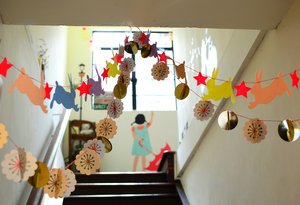
Initiating motion through curiosity
To us, research is a way to gain insights into learning, development and innovation in a way that exceeds one single practice. Furthermore, we use research as a learning intervention on its own. We mainly do applied research, which leads to practical tools or insights for everyday work. We also collaborate with students and knowledge institutions on scientific research in order to develop knowledge that can be generalised. We enjoy approaching our research in a way that does not only make us smarter, but also leads to learning for the people involved. That is why we are not always the ones to come up with the research, perform it and report on it. We just ask the people we work with to play an active role in this process.
The research we perform can come in many different forms:
- Action-research where the goal is to work on more involvement in a factory;
- Practical research to discover where employees of a home-care facility can make a difference;
- A group of students that examines the impact of learning interventions on customers;
- A study trip with a group of colleagues to the US;
- A doctorate research about the role of time in change processes;
- Group interviews for the dutch CPS into expectations of the Dutch on the EU;
- Stakeholder research for a government agency.
Related cases
-
 Investing in talents, does it pay off?
Investing in talents, does it pay off?
Scientific research into a strengths-based approachWe regularly support people in teams and organisations to discover and deploy their strengths. Our experience is that this is very beneficial. Inviting people to think about energizers in their work and what they are good at proves to be a source of enthusiasm. And it improves mutual relationships. But how does it work exactly? That's what we wanted to investigate. That's why we started a scientific study together with Prof. Marianne van Woerkom and Dr. Christina Meyers of Tilburg University: What exactly is the effect if people participate in workshops in which they are invited to discover and use their talents? Approach We were able to work for an association of five primary schools. We provided workshops for their teachers. First, a start-up meeting where they reflected on their own strengths and designed experiments to deploy these in their job. In a second meeting, six weeks later, participants reflected on what was successful and where they had managed to use their talents more effectively. ... ›› -
 Building self-organising teams in a factory
Building self-organising teams in a factory
Strengthening engagement and empowermentA mid-sized factory was faced with disappointing results. When looking for solutions, a number of other themes surfaced, such as a pigeonhole mentality and a strong focus on problems and impossibilities, instead of on solutions. The production manager had a dream, which he summed up as 'everyone happy and engaged at work!' His idea behind this is that if people feel involved in their work, when they can do what they are good at, and work together smoothly, this will lead to better product quality. And, ultimately, to a healthier business. He wanted to initiate this development in his factory. Approach Our support for this process started with a question we asked the production manager himself: "When do you come to work happily and fully engaged?" The ensuing conversation was so meaningful to him that he wanted to repeat it with his seven managers. So we invited them, along with a few other key people, to explore the same question together. ... ››